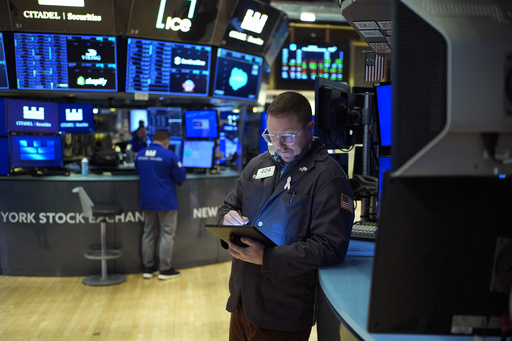NEW YORK — On Monday, the U.S. stock market experienced significant volatility as concerns regarding a potential trade war loomed large. Initially, stocks took a deep dive amid worries about the impact of President Trump’s proposed tariffs; however, the market began to recover some of its losses after Mexico announced a temporary one-month reprieve from these tariffs.
The S&P 500 ultimately finished down by 0.8%, while both the Dow Jones Industrial Average and the Nasdaq Composite also fell, losing 122 points (0.3%) and 1.2%, respectively. Early trading showed the S&P 500 briefly drop nearly 2%, with the Dow plummeting by as much as 665 points before a partial recovery set in as the day progressed.
Particular sectors such as Big Tech faced the most significant losses, raising concerns that rising interest rates—potentially a result of the tariffs—could severely impact companies reliant on global trade. The uncertainty surrounding the tariffs has raised fears of increasing prices for consumer goods, from groceries to electronics, adding pressure on U.S. inflation rates that had begun to moderate since peaking in recent years. Any increase in inflation could complicate the Federal Reserve’s plans to lower interest rates, which had started a month prior as a strategy to stimulate the U.S. economy through its slowdown in global trade activity.
However, U.S. stocks clawed back some losses after Mexican President Claudia Sheinbaum announced a temporary halt to the tariffs following a discussion with Trump. This information buoyed the market temporarily, with the Dow even posting a slight increase at one point during the afternoon. Following the U.S. market’s close, Canadian Prime Minister Justin Trudeau echoed this sentiment, indicating a similar 30-day pause following his own conversation with Trump.
There was a prevailing hope on Wall Street that Trump’s initial threats concerning tariffs were more about opening negotiation channels rather than establishing enduring policies. The day’s reactions to Mexico and Canada indicate the complexity and uncertainty behind Trump’s tariff strategy and whether they are part of a broader negotiation effort.
As traders entered the week, fears surged regarding the escalating trade disputes’ potential repercussions, including significant harm to economies worldwide, particularly the United States. Brian Jacobsen, chief economist at Annex Wealth Management, illustrated the possible local impact, mentioning that Midwest regions could feel the effects sooner due to reliance on Canadian crude for gasoline production.
The fluctuations in crude oil prices mirrored the uncertainty, with prices rising from $72.53 on Friday to almost $75 before settling back toward $72 by the market’s opening.
Trump warned the public that they might experience “some pain” due to tariffs but maintained that the outcome would be “worth the price” to restore America’s economic strength. He further indicated that import tariffs “will definitely happen” for the European Union and might also extend to the United Kingdom.
Despite the ongoing trade war tensions, Wall Street analysts are cautious but somehow optimistic, noting Trump’s vested interest in the stock market’s health, which could influence a shift in the administration’s trade policies if market volatility escalates. Solita Marcelli, chief investment officer for UBS Global Wealth Management, pointed out that significant market fluctuations could incentivize a change in strategy.
Several major corporations felt the brunt of the downturn. Constellation Brands, known for its portfolio of alcoholic beverages, fell 3.5%, while Best Buy, a significant retailer for electronics, dropped 2.4%. Additionally, Brown-Forman, parent company of Jack Daniel’s whiskey sold in Canada, saw a decline of 3.3%. In aggregate, the S&P 500 concluded the day down 45.96 points, settling at 5,994.57, while the Dow lost 122.75 points to end at 44,421.91, and the Nasdaq composite plummeted 235.49 points, closing at 19,391.96.
As the market endured fluctuations, investors shifted their focus toward longer-term U.S. government bonds, considered secure investments amid the instability. This increased demand led to a drop in Treasury yields, with the 10-year yield slipping from 4.55% to 4.53%, temporarily calming fears over a continuous rise in long-term interest rates.
Conversely, short-term Treasury yields saw a rise as the expectation for interest rate cuts by the Federal Reserve diminished, with the two-year yield rising to 4.25% from 4.21%. General apprehensions about rising yields added pressure on various investments, notably affecting high-valuation stocks, including Nvidia, which fell 2.8% amid ongoing concerns related to competition in the artificial intelligence sector.
The focus on Trump’s tariffs overshadowed other significant economic events this week, including employment reports and earnings releases from key companies like Alphabet and Amazon. Globally, stock markets also recorded declines, with UK indexes falling 1% and similar trends seen in European and Asian markets. South Korea’s Kospi dropped 2.5%, while Japan’s Nikkei 225 fell by 2.7%.



